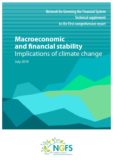Today the NGFS published a technical supplement “Macroeconomics and Financial Stability: Implications of Climate Change” to the April 2019 NGFS Comprehensive report. The supplement provides an overview of existing approaches for quantitatively assessing climate-related risks and identifies key areas for further research. It also sets out a menu of options for central banks and supervisors to assess the risks.
Going forward, the NGFS plans to publish additional technical documents to better equip central banks and supervisors with appropriate tools and methodologies to identify, quantify and mitigate climate risks in the financial system. This will include publishing further details on the NGFS transition scenarios and guidelines on scenario-based climate risk analysis.
“Understanding how climate change impacts the macroeconomy and the financial system is a necessary first step in central banks and supervisors judging the relevance of climate change to their mandates. This technical report is an important step in that direction, by identifying ways to better quantify and assess the impact of climate related risks on the economy and on financial stability” said Sarah Breeden, Bank of England and Chair of the NGFS Macrofinancial Workstream.
The NGFS coalition is growing. Since April, the NGFS has welcomed six new members: Abu Dhabi Financial Services Regulatory Authority, Central Bank of Malta, Commission de Surveillance du Secteur Financier (Luxembourg), Dubai Financial Services Authority, Hong Kong Monetary Authority, South African Reserve Bank. Also, two international standard-setting bodies have joined the NGFS as observers: the Basel Committee on Banking Supervision (BCBS) and the International Association of Insurance Supervisors (IAIS). Since its launch in December 2017 the NGFS membership has quickly expanded from its 8 original Members to 42 Members and 8 Observers. The NGFS has also engaged with two research networks: GRASFI (Global Research Alliance for Sustainable Finance and Investment) and INSPIRE (International Network for Sustainable Financial Policy Insights, Research, and Exchange).
Frank Elderson, chairman of the NGFS, welcomed its growing list of partners. “I want to warmly welcome the new NGFS members and observers. The participation of international standards setting bodies is a watershed moment and will be key to mutually reinforce our actions”.
About the NGFS
The NGFS, launched at the Paris One Planet Summit on 12 December 2017, is a group of Central Banks and Supervisors willing, on a voluntary basis, to share best practices and contribute to the development of environment and climate risk management in the financial sector and to mobilize mainstream finance to support the transition toward a sustainable economy. The NGFS is chaired by Frank Elderson, board member of De Nederlandsche Bank. The Secretariat is provided by Banque de France. The NGFS brings together 42 central banks and supervisors and 8 observers – representing five continents, over half of global greenhouse gas emissions and the supervision of more than two thirds of the global systemically important banks and insurers.






